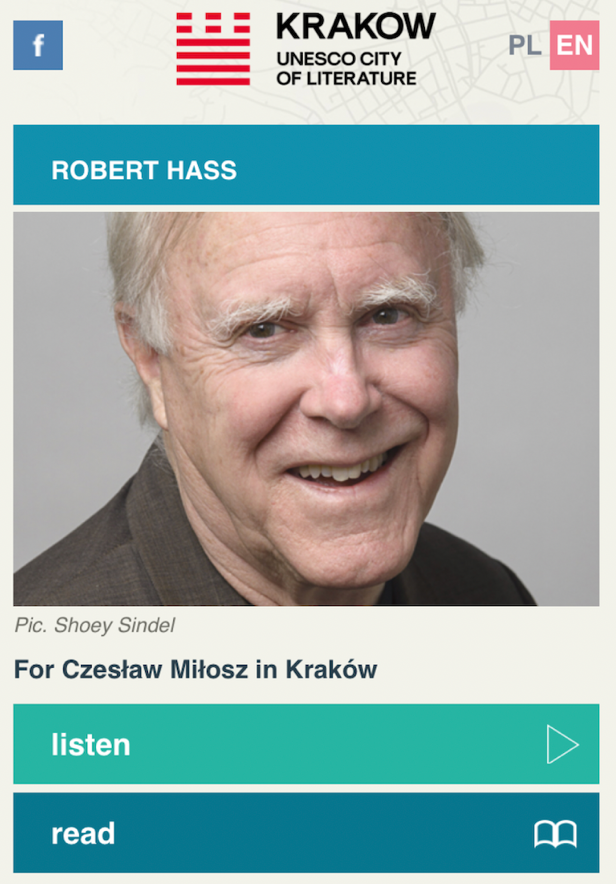Meeting with Writers and Poets in Kraków’s Literary Park
by Michael Downs
Please, let me tell you about Kraków.
Today, as I rode my bicycle around the park that surrounds the city’s medieval heart, I glimpsed two older women arguing good-naturedly while sitting on the Neil Gaiman bench. A woman, perhaps a student, sat on the bench dedicated to Polish journalist Jan Polkowski and captured a nearby building in her artist’s sketchbook.
It was about 55 degrees, cool but not by Kraków’s standards, so people crowded the paths that ran under trees losing their leaves. I rode on. At the bench dedicated to Wiśława Szymborska, the Nobel Prize-winning poet, a man in a yellow hoodie, hunched forward with elbows on knees, finished his cigarette. Fitting, given Szymborska’s well-known habit.
When UNESCO, the United Nations’ cultural preservation wing, named Kraków as a City of Literature in 2013, the organization was only conferring its imprimatur on a status Kraków has otherwise long held. Here, you’ll find a bookstore on most any street. The statue of a poet is the only statue in the heart of the city’s main square. Nobel Prize winners in literature—including Czesław Miłosz, Szymborska, and Henryk Sienkiewicz—have been associated with the city as teachers, students, or residents. Joseph Conrad lived here for a while, so the city’s weeklong festival of prose literature bears his name. Likewise, you’ll find major streets and avenues named for writers, journalists, and poets. When Poland’s most recent Nobel laureate, the fiction writer Olga Tokarczuk, signed books in a Kraków store, the line for her autograph snaked around several city blocks.

And, in the park called the Planty, on more than one hundred benches, you can sit with a writer and the writer will speak with you.
The Planty’s shape might put you in mind of a teardrop. It was built over what was once a medieval moat, and as the Central Park of Kraków, it is almost always crowded. I like to write while sitting on one of the many green benches. Nearby, lovers might cuddle. I’ve seen men set up tables by the benches to sell used books. Tourists sit on them to feed their children ice cream. I watch life walk by, admire whatever architecture or sculpture is in sight, and type.

More than one hundred of the green benches around the Planty are marked with a small silver plate. Each plate bears the name of a writer, poet, or journalist who has some association with Kraków. Most are Poles, like Stanisław Lem, the science fiction writer and most translated Polish writer. Others have contributed to a wider understanding of Polish literature and culture. William Styron, an American, has a bench because of his novel, Sophie’s Choice, a National Book Award winner about a Polish woman imprisoned at Auschwitz. Robert Hass, the American poet, has a bench because of his work translating Miłosz’s poetry into English. Each plate comes with a QR code. Scan it, and you’ll find a web page with a photo and biography of the writer, plus a sample of their work which you can read in Polish or English or listen to.
It is pleasant to write in such company. Some of them are ghosts now, true, but who minds those? And others remain vital, with new ones added through the years. Together, they remind me that literature is nothing new and that to live in it is to make a life of it, and to make a life of it is to live in it. Also, it is better done in a place where pigeons bob and weave about your feet.
Mostly, though, to sit in the Planty and write or read gives a writer encouragement. Because in Kraków, literature matters to the dentist and the shopkeeper and the student. Here is a city where a writer will meet you on a park bench, then offer you a poem or tell you a tale. Here, you can sit with, say, the poet Adam Zagajewski, though he died only last March, and he can tell you that
Seen from outside I doubtless
seem immobile, almost dead,
resigned, deserving sympathy.
But it’s not so—I’m free,
maybe even happy.
Yes, I hold my heavy head
in my hands,
but inside it a poem’s being born.
Links
Krakow’s map of literary benches
Robert Hass reading “For Czesław Miłosz in Kraków”
Adam Zagajewski’s page from his Planty bench
Michael Downs, who serves on the board of Baltimore Review, will spend the next several months living and writing in Kraków as a U.S. Fulbright Scholar. He will periodically write here on the BR blog regarding literary Kraków. He’s the author, most recently, of the novel The Strange and True Tale of Horace Wells, Surgeon Dentist. Learn more about him at michael-downs.net.
